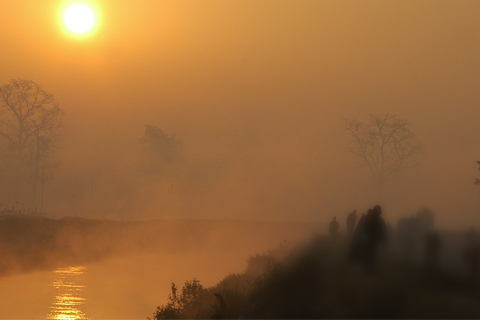The Climate Crisis is a Human Rights Crisis
We must acknowledge that the worsening condition of our planet exacerbates human rights challenges.
We must acknowledge that the worsening condition of our planet exacerbates human rights challenges.

Most of us know the earth is hotter than it has ever been in the century-plus such records have been kept – in fact, scientists say you’d have to go back 125,000 years to find a significantly higher temperature than we have now.
We also know it’s more than just a comfort issue. The UN’s Intergovernmental Panel on Climate Change warns that an increase of 2-3°C could bring massive species extinctions, widespread starvation, declining crop production and a rise in sea levels that could threaten much of the world’s coastal areas.
In the regions and continents where most of Humanity United’s partners focus their efforts, the increase is happening even faster than the global average: twice as fast in Asia, twice as fast in the Gulf region, and faster than average throughout Africa – despite African countries accounting for only 4 percent of global greenhouse gas emissions.
The United Nations’ 27th Annual Climate Change Conference (COP27) has now come to a close, and the best that attendees could do was land on a goal of keeping the increase to 1.5°C above pre-industrial temperatures by the end of the decade – along with a plan that advocates for the environment say will not get us there.
This is a human rights crisis.
We must acknowledge that the worsening condition of our planet exacerbates human rights challenges. At HU, we seek to cultivate the conditions for enduring peace and freedom. The inability and unwillingness of world leaders to take meaningful action on the climate crisis continues to push peace and freedom out of reach for too many of the world’s most vulnerable populations.
As air quality and heat-related illnesses increase, those who work outdoors have increasingly fewer options of where and when they can work without risking their health or their livelihoods. As more land becomes unlivable, new and even less-protected migration corridors may open up. As natural resources continue to be recklessly extracted and shipped elsewhere and land becomes increasingly unfarmable, commodity shortages may lead to greater conflict.
People have increasingly fewer choices of where they can safely live, plant food, breathe clean air, drink clean water, and earn a sufficient living. As choices are taken away from people, they become more vulnerable to the harms of conflict and exploitation.
Issues of justice are all inextricably linked, both in how they affect each other, and in how they all stem from the same source. Exploitation – of people and the environment alike – is an integral part of the most common paths to wealth, power and influence in our global society.
Those who hold that status have built powerful interlocking systems and structures to shield themselves from accountability, among which is the systematic silencing of critics.
In many of the conflict regions in which we operate, governments are stepping up surveillance on activists and peacebuilders, or are responding to conflict with overly securitized approaches that lead to ongoing cycles of violence.
We’ve seen activists, civil society organizations, whistleblowers, and even government ministers shunned or punished for their attempts to bring attention to exploitative conditions for workers, or regulate industry. Journalists – from The Guardian to Arab Reporters for Investigative Journalism to bloggers and TikTokkers – have been prevented from gaining access to critical information or punished for their efforts to disseminate it.
But there is always hope. It is becoming continuously harder to keep information from the public. There is continued movement toward stronger regulation of the businesses that profit immensely from exploiting the planet and its people. We’re now seeing laws that preserve a greater share of local resources for local populations. Citizens are also making greater demands of their elected officials, calling on them to act to save future generations.
Passionate and persistent people, many with lived experience and many who are young, are becoming organizers and leaders. Through their intersectional lens and deft coalition building, they are being recognized as sources of critical ideas and solutions.
These voices have always been there, but those who benefit from the status quo have worked to keep them quiet. Those of us seeking to change the status quo from positions of privilege have, all too often, talked right over them.
It is crucial that we listen to these voices, learn from them, invite them to lead us, and use our influence to make as much space for them as we can so that others may do the same. This is just as true for how we must address the climate crisis as it is for all human rights work, including our own.